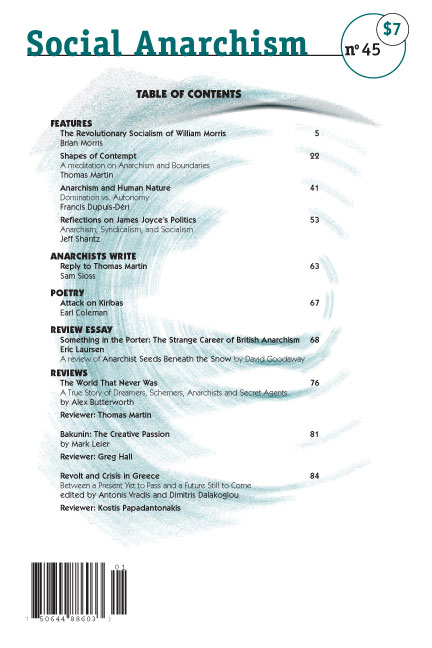Anarchism and Human Nature
Page: 2
Human Nature And The Political As A Wish To Dominate
Anarchism is also taken to task for forgetting that the political intrinsically involves relationships of power and the will to dominate. If follows from this critique, that can overlap the critique of optimism, that no human community can prevent the emergence and ascendancy of leaders, even when its social-political organization is theoretically egalitarian. Ambitious individual always manage more or less insidiously to impose their will, either formally or informally, on the other members of the community because of their personality or their skills.
This viewpoint comes in two forms: the first is mainly sociological while the other is grounded primarily in biology. The sociological approach maintains that any community includes a certain number of individuals who are at once, ambitious, cunning, and charismatic and who eventually succeed in decisively influencing collective decisions to a greater or lesser extent. This is what the sociologist Robert Michels has called the “iron law of oligarchy”, by which he means the ineluctable phenomenon of the constitution of a hierarchy or an elite in any human group endeavouring to organize itself (with regard to social movements, see Diani 2003). His renowned study of the German social-democratic parties of the early 20th century even includes a chapter on anarchist organizations, in which he identifies leaders. Finally, an early 20th century psychologist who wrote a book denouncing the anarchists, declares, “it is by the wish of one to rise about the other, to acquire or produce that which can provide a benefit, that humanity attests to its vitality [… ] in sum to all our progress” (Gouzer circa 1920: 27-28).
The biological approach expresses a form of social Darwinism, revamped during the 1960s by socio-biologists such as Konrad Lorenz (Nobel laureate in 1973) and Edward O. Wilson, who won the Pulitzer Prize and made newspaper and magazine headlines when he published On Human Nature. His ideas, now upheld by “evolutionary psychology,” appeal to common sense and are illustrated by reports on chimpanzee alpha males. According to Wilson, human beings are naturally aggressive for reasons of natural adaptation and tend to organize themselves hierarchically in order to increase their chances of surviving and to maximize the spread of their genetic heritage.
Sociologists and political scientists like Raymond Aron and Maurice Duverger also affirm that politics and biology are linked. Duverger (1964: 32) states, for example, “politics has a biological basis.” He adds , “The study of animal societies shows the development of phenomena of authority and the organization of power, which bear comparison to analogous phenomena in human societies. Politics appeared on earth before human beings.” Raymond Aron (1962: 340) goes even further, claiming that, “whether animal or human, combativeness does indeed have properly biological roots,” and that “each human individual is genetically endowed with a degree of aggressiveness.” In 1998, Francis Fukuyama opened an article dealing with the influence of women in the political life of the United States by talking about “chimpanzee politics”.
Is There A Human Nature?
Rather than grappling with the rhetorical debate on the subject of human nature, perhaps anarchists should simply ignore this notion. Doing so would make all the more sense for anarchists because the rhetoric of human nature has often served to justify unjust systems of domination and exploitation, such as slavery in the United States in the 19th century (Kropotkin 1998: 83-84). In this connection, the anarchists McKay, Elkin, Neal and Boraas (circa 2007: 1) observe, “what is considered ‘human nature’ can change with changing social circumstances. For example, slavery was considered part of ‘human nature’ and ‘normal’ for thousands of years. Homosexuality was considered perfectly normal by ancient Greeks yet thousands of years later the Christian church denounced it as unnatural.” For his part, anthropologist Marshall Sahlins (2008), in his evocatively titled book, The Western Illusion of Human Nature: With Reflections on the Long History of Hierarchy, Equality and the Sublimation of Anarchy in the West, and Comparative Notes on Other Conceptions of the Human Condition, explains that the representation of human nature as individualist and egotistical can be attributed to modern Western liberalism. In his view, virtually all other cultures and civilizations conceive of human nature as above all communitarian and inclined to solidarity, and regard an individualist and egotistical personality as both pathological and dangerous.
Consequently, the anarchist feminist Susan Brown (1993: 153) suggests that the idea of “human nature” be quite simply dispensed with because it is incompatible with properly understood anarchism: “The positing of a fixed, co-operative human nature presents certain problems for anarchism as it contradicts anarchism’s commitment to free will and the existentially free individual. Anarchism does not have to posit a fixed human nature.” She adds, “the notion of human nature must be abandoned entirely. This strategy is necessary, as human nature and human freedom are irreconcilable” (Brown 1993: 62).
Peter Marshall (1989: 138), a historian of anarchism, seems to agree with Brown: “It is my view that we should abandon the use of the term ‘human nature’ since it implies that there is a fixed essence within us […]. Sweeping assertions about human nature are notoriously suspect.” However, he goes on to write, “As for the controversy about whether we are ‘naturally’ good or bad, selfish or benevolent, gentle or aggressive, I consider the search for one irreducible quality to be as absurd and reductionist as looking for a human essence. We have innate tendencies for both types of behaviour; it is our circumstances which encourage or check them” (P. Marshall 1989: 142). Finally, Judith Suissa (2010: 25) sees “the concept of human nature [as] inherently problematic,” yet she insists that “what is important in the present context is the methodological role which the concept of human nature has played within philosophical position,” concluding that “the notion of a common human nature can be a useful conceptual tool […] in philosophically evaluating particular normative positions.” Thus, instead of rejecting holus bolus the very notion of “human nature,” some anarchists try to ponder it precisely on the basis of anarchist principles in order to demonstrate that anarchism is not incompatible with human nature.

